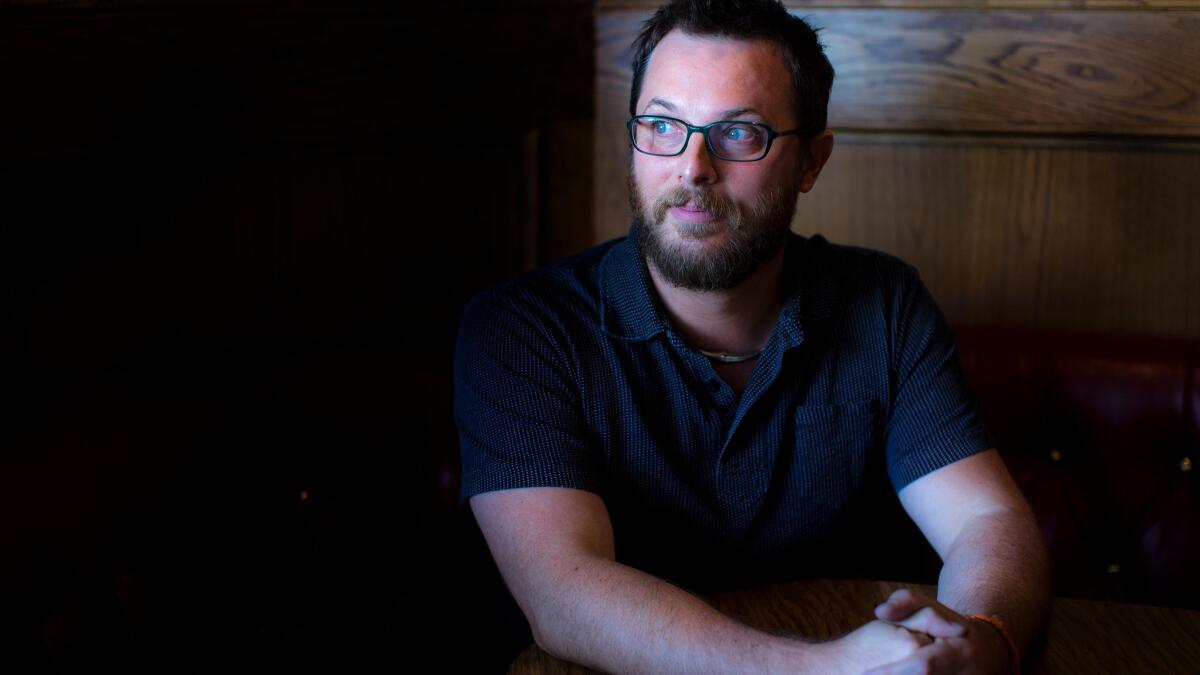For director Duncan Jones, making ‘Warcraft’ is a film about adventure, family in the wake of family tragedy

- Share via
Duncan Jones built a fantasy world filled with green Orcs, winged griffins and spell-casting wizards in his feature film “Warcraft.” But it is in crafting the touches of realism that the director really had to go to war.
Specifically, one of his biggest fights was over the casting of an interracial brother and sister, and if you know Jones’ family, you know that’s personal.
“My family is very international,” Jones says tucked away in a red banquette in the Buchanan Arms, a Los Angeles pub. “My stepmom’s from Somalia, my baby sister is African American, my dad was always English, I’m a white man… You may have noticed.” The bearded director pauses to let the charm sink in, before launching back into his explanation. “I wanted to try and mix it up as much as I could on the film.”
The English father he’s referring to is rock legend David Bowie, who recently passed away earlier this year before the completion of Jones’ latest work. His sister is Bowie and Iman’s daughter, Alexandria Zahra Jones. The director wanted the fantasy world of “Warcraft,” which premieres this week, to reflect the real one in as many ways as possible. So when Jones needed to cast the brother and sister roles of Lady Taria and Anduin Lothar, he turned to Ethiopian Irish actress Ruth Negga and Australian actor Travis Fimmel, a move that clearly echoed his own personal life.
This idea was a hard sell. “I fought and I fought and I fought to make that happen, and it took a long time,” Jones says. In fact, “It took a couple of years.” But he would eventually succeed, as the “Warcraft” posters pasted across L.A. will show you, (Fimmel is the guy on the right in the blue paint, sans tusks).
After a long day of press, Jones is taking a break for pub food at the Buchanan Arms. The location reminds Jones of his former home in London. And it also serves sticky toffee pudding.
Ale-free (Jones doesn’t drink) and under the watchful eye of a portrait of Winston Churchill, Jones elaborates on why he wanted his “Warcraft” to reflect not only the varied gamers of Blizzard’s mega-popular video game franchise, but his own life as well.
“I think all of us, especially in the climate these days, we’re trying to look for ways to be more reflective of society and not going back to things which seem easy,” Jones says. “In a tiny, tiny, little way, we pushed a little frontier. We nudged our little bit here as far as you can have fraternal relationships where a brother and sister may not be of the same race. That’s not impossible.”
Not something many would expect from a movie where half the cast is made up of towering computer-generated Orcs, but science fiction and fantasy are often gateways for social commentary. And Jones has been using genre to spark larger discussions since his first feature “Moon” debuted at Sundance in 2009.
The retro-tinged, critically adored sci-fi film put Jones on coveted “directors to watch” lists along with his contemporaries such as Rian Johnson (“Looper”) and Neill Blomkamp (“District 9”). His eagerly anticipated follow-up, “Source Code,” dropped in 2011. The action-heavy, time-twisting Jake Gyllenhaal thriller was a relatively modest success, grossing $147.3 million worldwide (on a reported $32 million budget) and “all of the expected people came knocking,” Jones recalls.
“I didn’t want to do a sequel,” he says of the uninspired studio offers that were coming his way. “The people I admire are the ones who start these worlds and have the opportunity to be in the creative seat when they come together. I didn’t want to have something that was pre-established and tell stories in a world that already had a whole bunch of rules set for it. There was already going to be that on the Blizzard side of things, as far as what they wanted it to be, but there was still the opportunity to make it the first film, and hopefully the second and the third.” (And with the way his film is tracking in China, with $92 million in the first two days of release, the chances of that are looking pretty good.)
But how did Jones persuade Blizzard to hand over the keys to its most prized property, one with hundreds of millions of active gamers? “You are playing a tricky game, you don’t want to tarnish their image, because their business is not the movie,” Jones says. “It is a different dynamic than I think Hollywood is used to. Normally you come in there as, ‘I’m a Hollywood studio, I’m going to make a movie out of your little life.’ It’s not that at all. We’re the small fry in that relationship.”
However, the fact that Duncan had 20 years of experience actually playing “Warcraft,” paired with his progressive new takes that pushed the game beyond its own constraints, really hit home with the studio. Any “Warcraft” film worth its salt would undoubtedly be centered on a horde of Orcs fighting an army of humans. It’s the base level premise of the video game, and apparently a common pitch the creators were tired of fielding from the directors who previously lobbied for the gig. But Jones’ idea expanded past the basic “versus” movie construct.
Stuart Fenegan, Jones’s producing partner since the “Moon” days, was in the room when Jones pitched his take to the brass at Legendary, Atlas and, most importantly, Blizzard. “He said, ‘This movie can’t be about Orcs versus humans. It has to be about Orcs and humans. There have to be heroes on both sides of the fence.’ [Senior Vice President of Story and Franchise Development at Blizzard] Chris Metzen’s eyes just lit up and all the guys at Blizzard just said, ‘Yes! OK, him.’ And that was it.”
And from there the three-and-a-half-year battle of making “Warcraft” was on. Jones would begin to push for ideas outside the norm for fantasy. For example, no longer would every fantasy character come with the requisite English accent. The higher-ups noticed. “This is ‘Warcraft,’” Jones explains. “This isn’t Tolkien. This isn’t British folklore. This isn’t history. This is ‘Warcraft,’ and ‘Warcraft’ [players] are from all over the world.”
The plot was injected with operatic drama. The hulking Orc protagonist Durotan (played by Toby Kebbell) was given a hero’s story line and a pregnant Orc wife Draka (played by Anna Galvin) goes into one of the most dramatic birth scenes ever depicted on screen. “Duncan had a very clear vision of what he wanted to do when [my character was] in labor,” Galvin says. “We were on this marshy ground, which they kept spraying down with real water. Duncan dropped [to his knees] beside me and we were both sort of crawling on all fours.”
And now that the long road to making the first “Warcraft” is over Jones feels like he’s joined a fraternity of creators who crossed over.
“It’s kind of weird, because there has been this – especially over the last five or six years -- community of directors who are brought in from small independent films that come and head up these big studio films. Everyone has their own reasons for taking those jobs or not taking those jobs. I think those of us who have decided to do these big movies, there is a unique experience, kind of a thousand-yard stare that we probably have at the end of that, that allows us to kind of, ‘I know what you’ve been through.’”
That stare might get a bit longer, because in October Jones will head to Berlin with actors Paul Rudd and Alexander Skarsgard to film his long-held, passion project “Mute.” Another science fiction offering Jones fanatics have been whispering about his futuristic plans for Berlin for almost eight years. How will the filmmaker change our future next? Only his future will tell.
One thing the future is sure to bring is family: Jones’ wife, Rodene Ronquillo, is pregnant with their first child. It’s phenomenal news for the couple, whose “Warcraft” journey was marked with personal heartache: Ronquillo was diagnosed with cancer at the beginning of Jones’ work on “Warcraft.”
“I think we always knew, from before we made the film, we knew we wanted to start a family,” Jones says. “We had to wait for her to recover, but we knew we wanted to. ... To now see the scenes of Durotan and his wife, Draka, when we’re that couple now, that’s really kind of special.”
Jones would announce the oncoming birth to the Internet one month after the tragic passing of his father. Call it the circle of life.
The odd circuity of Jones welcoming a new life in the wake of his fantasy epic prompted him to recall his own prophetic visit to his father’s fantasy epic, 1986’s “Labyrinth,” where Bowie was playing the mythical figure of Jareth the Goblin King: “It was absolutely an amazing experience to be on one of those world-building kind of movies and actually see it from on the ground, behind the camera. I think I managed to puppeteer a puppet in one of the busier street scenes in that film. It was absolutely one of those inspiring moments that makes you think, ‘Oh my God, people do this for a living. I’d love to be able to do that.’”
More to Read
The biggest entertainment stories
Get our big stories about Hollywood, film, television, music, arts, culture and more right in your inbox as soon as they publish.
You may occasionally receive promotional content from the Los Angeles Times.











